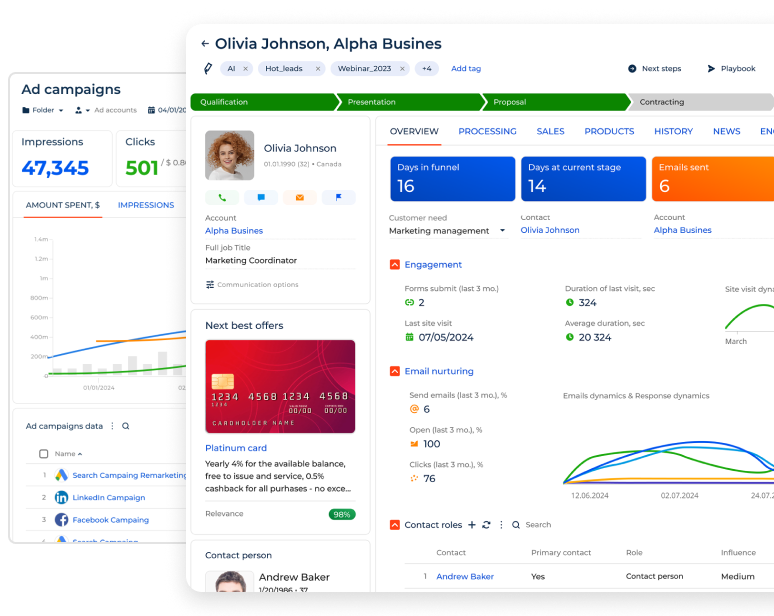-
No-Code
Platform
-
Studio
No-code agentic platform delivering the fastest time-to-value and the highest ROI
-
Studio
-
AI-Native CRM
CRM
-
AI-Native CRM
New era CRM to manage customer & operational workflows
CRM Products -
AI-Native CRM
- Industries
- Customers
- Partners
- About
Creatio CRM: Sell More With Less Effort

Imagine having a tailor-made solution designed to meet the unique needs of retail businesses where all your customers' data and purchase history are securely stored in a centralized hub and easily accessible to every member of your team. With retail CRM systems, this vision becomes a reality. By providing a comprehensive view of each customer's interactions, preferences, and buying behavior, retail CRM systems enable retailers to personalize their approach and anticipate needs.
So, if your retail operations have outgrown simple tools like Google spreadsheets, it's time to upgrade to a solution designed to streamline retail processes, enhance customer relationships, and drive growth – the retail CRM.
What is CRM?
Customer Relationship Management (CRM) is a software that helps businesses engage and nurture leads, turn prospects into customers, and maintain long-term relationships with their clients.
CRM software stores and processes data such as customer information, history of interaction with the company, documents, sales quotes, etc. from various touchpoints in a centralized hub. This data is easily accessible to all customer-facing departments, streamlining business processes and facilitating collaboration among sales, marketing, and service teams.
With full access to this information, businesses can maximize the effectiveness of their marketing efforts, drive sales, and improve customer service by delivering personalized customer experiences.
Find out more about what is CRM from our article!
What is a Retail CRM?
A retail CRM is a software designed to address the unique challenges and opportunities within the retail sector. It supports high-frequency, repeat purchasing of a business-to-consumer (B2C) model by centralising and managing data, interactions, and transactions across multiple channels.
Retail CRM software empowers businesses to streamline sales processes and enhance marketing efforts by providing insights into customer preferences. By leveraging this information, retail stores can tailor personalised experiences, deliver targeted promotions, and provide exceptional customer service. For example, retail CRM will suggest the best time to reach out to a customer with an offer tailored to their current needs based on their omnichannel order history and behaviour.
In addition to streamlining sales processes, enhancing marketing efforts, and improving customer service, retail CRM systems also automate repetitive tasks, saving time and resources. According to McKinsey, 40% of all activities within the retail business can be automated with a CRM.
By automating tasks such as data entry, and email communications with a set of predefined templates and triggers, retail CRM systems enable retailers to focus on high-value activities like nurturing customer relationships. This automation not only increases productivity but also ensures consistency and accuracy across all customer interactions, leading to improved customer satisfaction and loyalty. Whether it's sending personalized follow-up emails, or updating inventory levels, automation plays a crucial role in optimizing operations.
Why do Retailers Need a CRM?
In this section, we'll go over the benefits that CRMs for retail provide, focusing on how they empower retailers to enhance customer relationships, streamline operations, and drive business growth. From gaining valuable insights to executing strategic marketing campaigns, retail CRM solutions play a pivotal role in helping retailers succeed in today's competitive market.
Here are some key benefits that CRM solutions provide to the retail industry:
- Enhanced customer insights – retail CRM systems enable retailers to gather comprehensive data about their customers, including purchase history, preferences, and behaviour patterns. By analyzing this information, retailers can gain valuable insights into customer trends and preferences, allowing them to tailor their marketing efforts and product offerings to better meet customer needs.
- Improved customer engagement – with CRM, retailers can improve their customer relationships and engage with them on a more personalized level. By segmenting customers based on demographics, purchasing behaviour, or other criteria, retailers can send targeted marketing messages, promotions, and offers that are more likely to resonate with individual customers, driving sales and customer satisfaction.
- Efficient inventory management – CRM systems can help retailers optimize their inventory management processes. By tracking sales data in real-time and forecasting future demand, retailers can ensure they have the right products in stock at the right time, minimizing stockouts and overstock situations. Additionally, CRM can automate reorder processes and provide insights into which products are selling well and which may need to be discounted or discontinued.
- Personalized marketing campaigns – CRM platforms enable retailers to plan and execute personalized marketing campaigns. By leveraging customer data and insights, retailers can create targeted marketing campaigns that resonate with their target audience, driving higher engagement and conversion rates. Additionally, CRM systems provide tools for tracking campaign performance and ROI, allowing retailers to optimize their marketing efforts over time.
- Streamlined customer service – retail CRM systems streamline service processes, allowing retailers to provide faster, more personalized support to their customers. By centralizing customer information in one platform, retailers can quickly access purchase history, preferences, and previous interactions, improving customer communications and resolving inquiries and issues more efficiently.
- Increased sales and revenue – ultimately, the goal of retail CRMs is to increase sales and revenue. By leveraging the insights and capabilities provided by CRM solutions, the sales team can better understand customers, improve customer engagement and satisfaction, and streamline operations – all of which contribute to increased sales and revenue.
Features of CRM for Retail
In this section, we’ll explore key features of retail CRM solutions, based on the Creatio offer. As one of the leading CRM platforms, Creatio provides functionalities necessary for retail businesses to thrive in today’s competitive market.
Below are the key retail CRM features for retail stores:
1. Customer data management
Customer data management is a cornerstone of retail CRM systems, empowering businesses to efficiently store and manage customer information. All contact details, purchase history, preferences, and interactions across various touchpoints are stored in a centralized customer database. It provides retailers with a holistic view of their customers, enabling them to derive valuable insights into purchasing patterns, preferences, and behaviours. This information can be used to personalize marketing efforts, tailor product recommendations, and deliver targeted promotions.
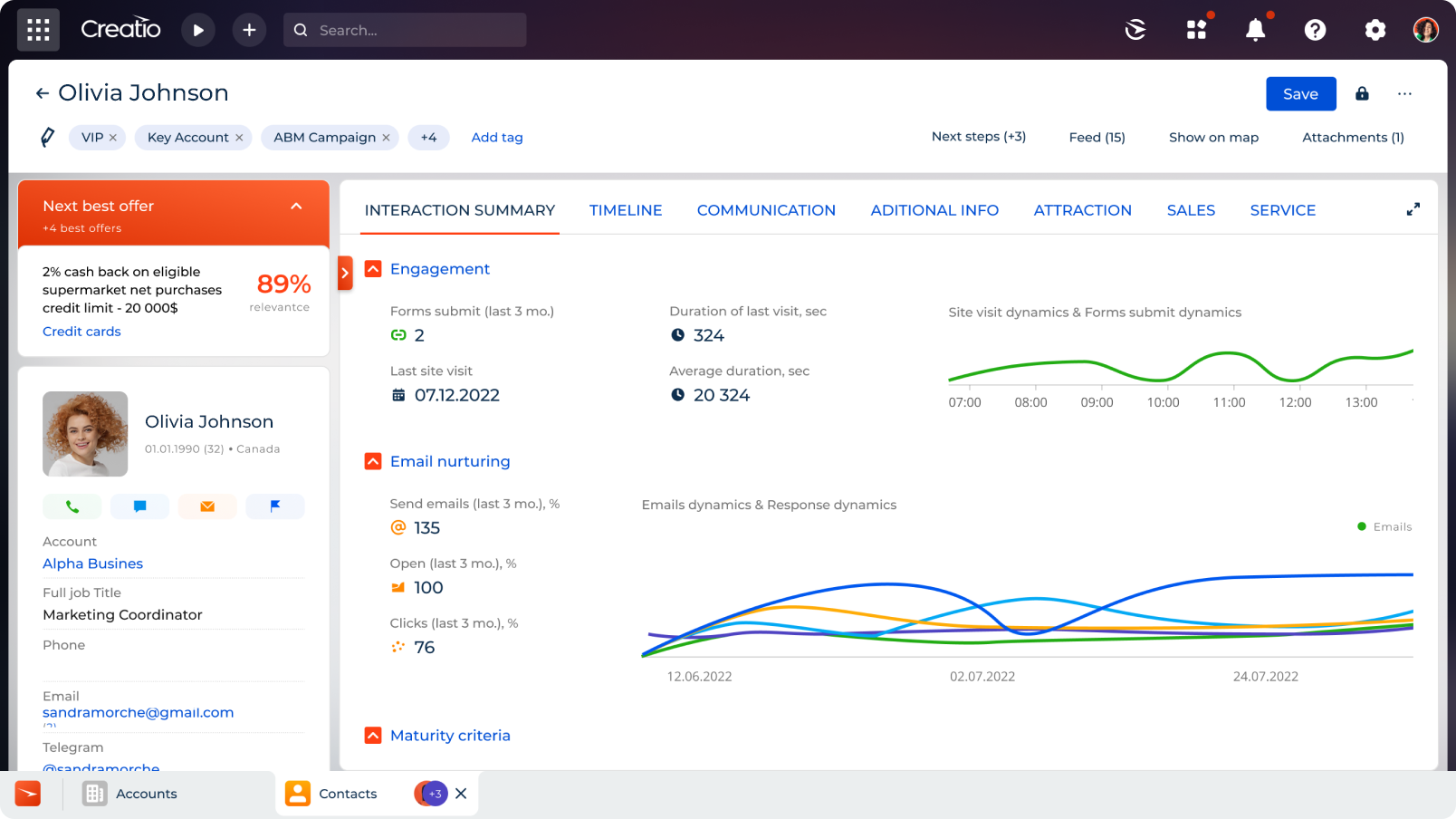
Creatio’s customer 360
Additionally, CRM platforms often include advanced segmentation capabilities, allowing retailers to categorize customers based on demographics, purchase history, and other criteria, further enhancing the effectiveness of their marketing efforts. By leveraging customer data in this way, retail CRM systems empower businesses to connect with their customers, increase engagement, and ultimately, boost sales and customer loyalty.
2. Merchandise management
Merchandise management is one of the key features of retail CRM systems, that helps businesses plan and optimize product offerings across multiple channels, regions, and stores. With retail CRM, businesses can leverage features to set prices for different products, customer segments, and distribution channels, based on comprehensive data analysis. This enables retailers to maximize profitability while remaining competitive. CRM solutions also offer automated workflows for product launches, streamlining the introduction of new products in different markets.
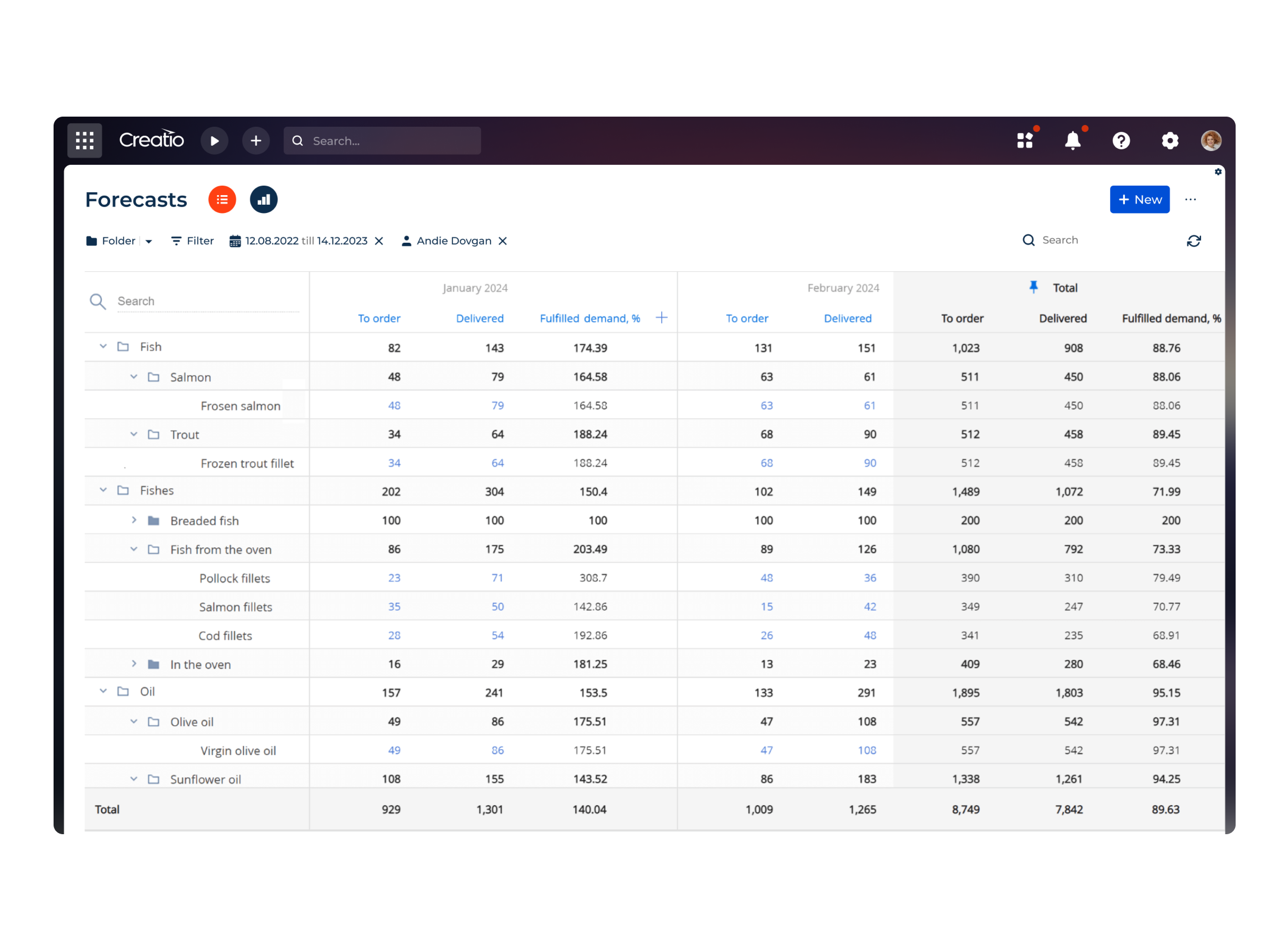
Creatio’s merchandise management
Furthermore, retail CRM systems provide retailers with valuable insights through comprehensive reporting and analytics capabilities. Retailers can monitor various metrics such as order volumes, customer demographics, best-selling products, and more. By analysing this data, businesses can forecast sales, identify trends, spot opportunities, and make informed decisions to optimize their product assortment, pricing strategies, and marketing campaigns.
3. Procurement and logistics
In addition to merchandise management, retail CRM software plays a vital role in procurement and logistics, enabling retailers to streamline operations and enhance efficiency throughout the supply chain. With retail CRM, businesses can efficiently manage supplier relationships and automate key procurement workflows, such as purchase requisitions, supplier onboarding, and contract approvals. By centralizing vendor information and streamlining procurement processes, retailers can optimize purchasing decisions, reduce costs, and improve their supply chain.
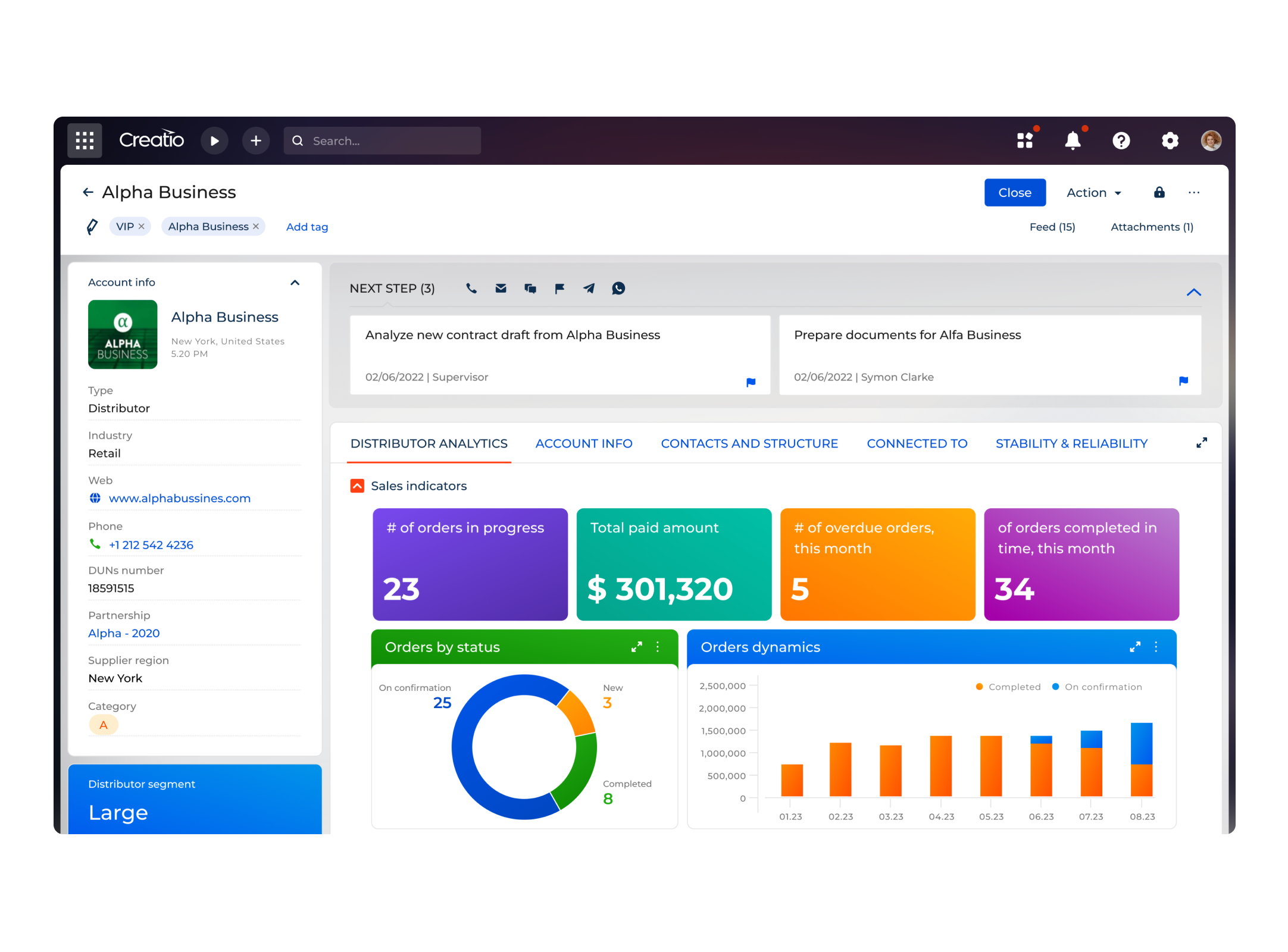
Creatio’s procurement and logistics
Furthermore, retail CRM systems provide robust capabilities for managing sales associate networks, thus facilitating communication and collaboration with vendors, suppliers, manufacturers, and distributors. With a centralized database housing up-to-date information, retailers can effectively manage relationships with their partners, ensuring seamless collaboration and coordination across the supply chain.
Moreover, CRM platforms offer advanced document management features, providing secure storage for contracts, agreements, and other important documents. By automating document management workflows, retailers can streamline administrative processes, and ensure compliance with regulatory requirements.
4. Store operations
Retail CRM systems help retail stores improve their operations and enhance overall efficiency across franchise networks. These systems provide retailers with tools to simplify franchise management by establishing effective communication channels between different stores and teams, facilitating the implementation of unified operations and standards across the franchise network.
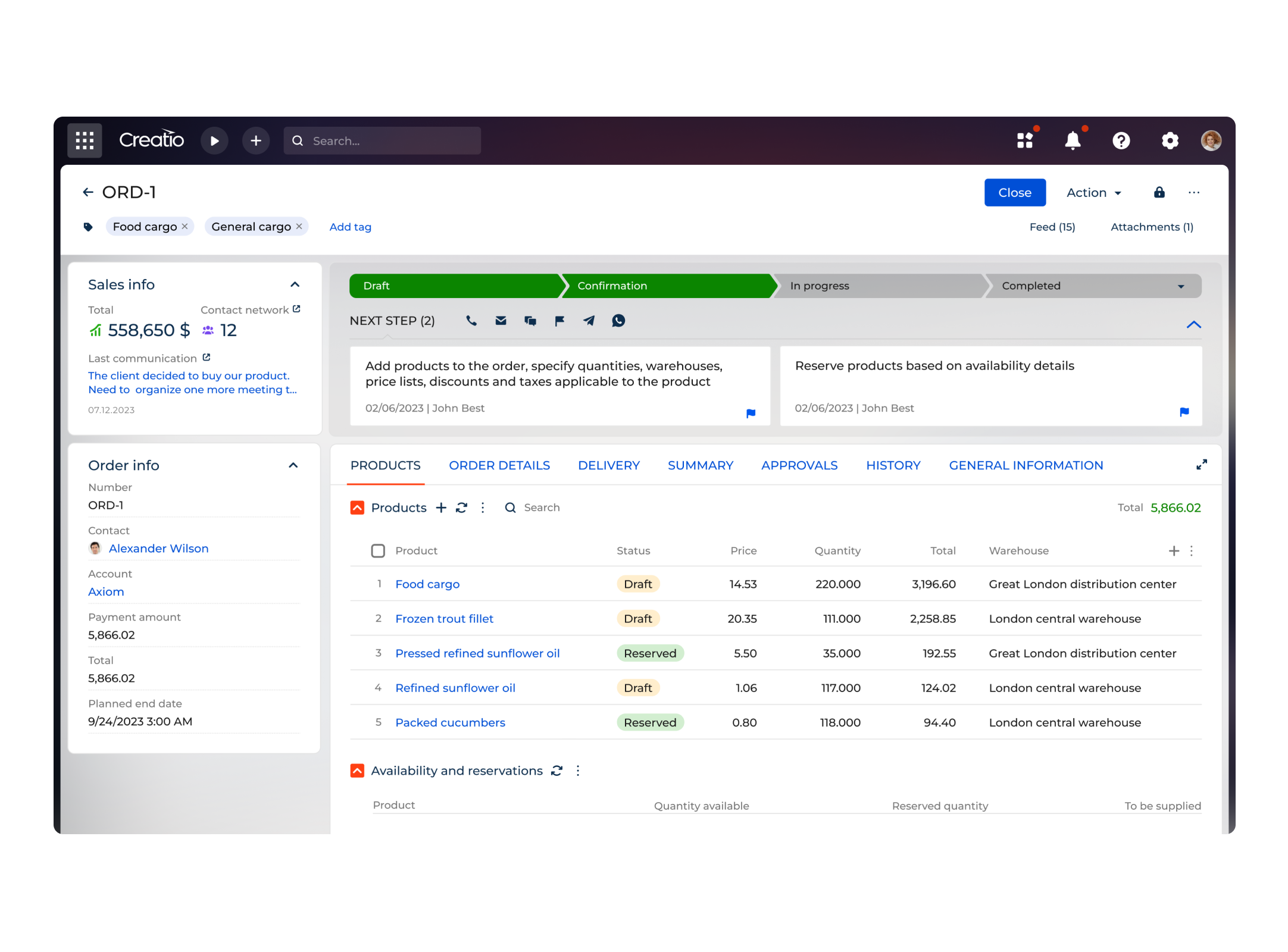
Creatio’s store operations
With a retail CRM system, all shops within a franchise can track real-time inventory stock levels, to prevent delivery delays, ensure timely fulfillment of orders, and avoid understocking and overstocking. By having access to up-to-date inventory data, franchisees can make informed decisions and optimize stock levels to meet customer demand effectively. They can also analyse daily sales and manage employee schedules to ensure optimal staffing levels and efficient store operations.
5. Customer service and support
Customer service and support are important components of retail CRM solutions, enabling businesses to provide exceptional experiences to their clients. By centralizing support interactions, managing service requests, and tracking resolution times, CRM streamlines the customer service process, ensuring timely responses and efficient issue resolution.
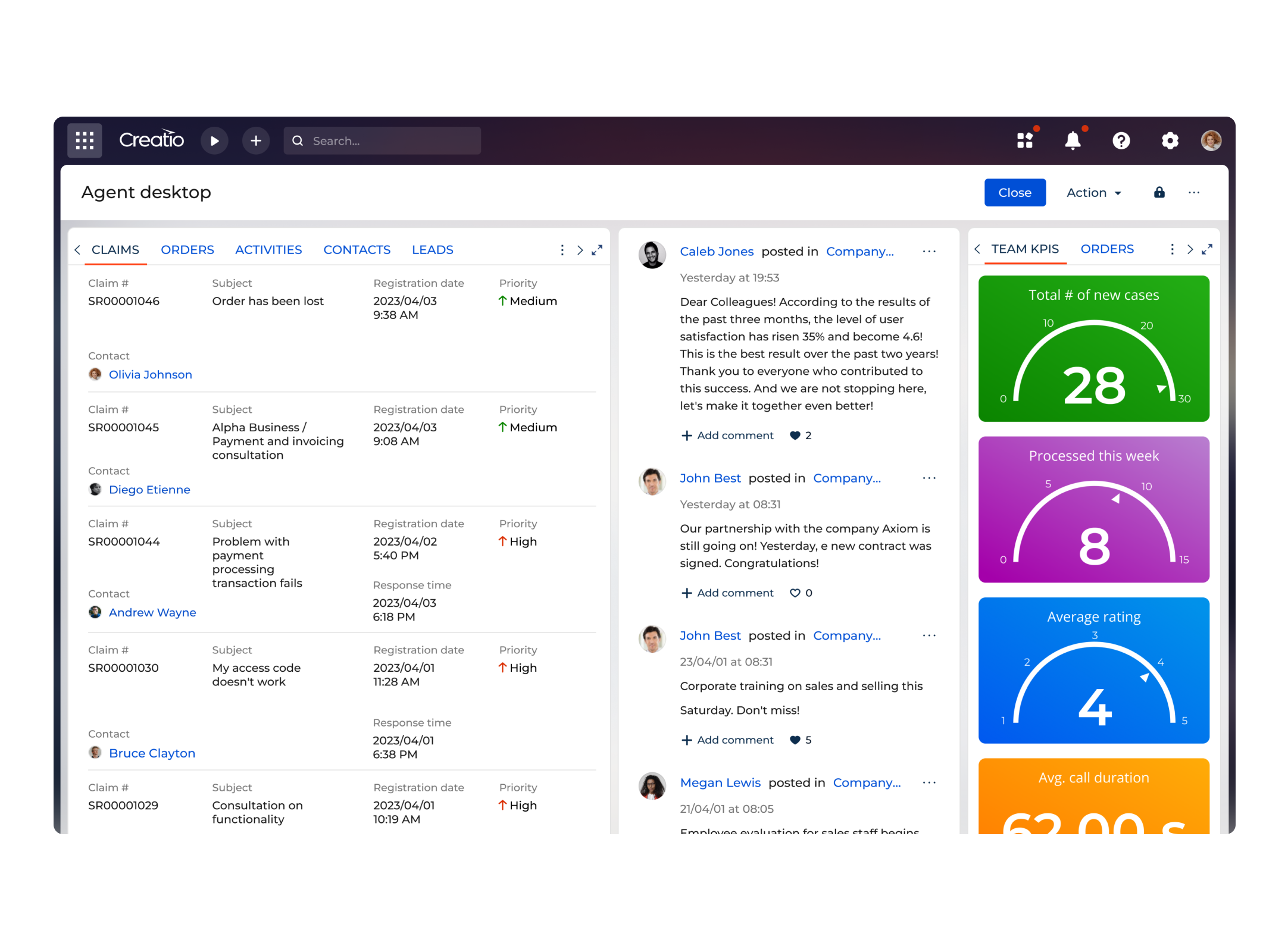
Creatio’s customer service
Furthermore, with retail CRM, businesses can leverage comprehensive customer data and insights to anticipate and proactively address customer needs, delivering personalized support. This not only enhances customer satisfaction but also strengthens brand loyalty and advocacy.
6. Marketing campaign management
With retail CRMs, organizations can plan, execute, and track marketing campaigns efficiently, driving customer engagement and loyalty. Centralized customer information and segmentation capabilities empower marketing teams to create targeted, omnichannel campaigns tailored to individual customer preferences. By leveraging customer data and insights, businesses can deliver personalized offers and messaging that resonate with their target audience, increasing the effectiveness of their marketing efforts.
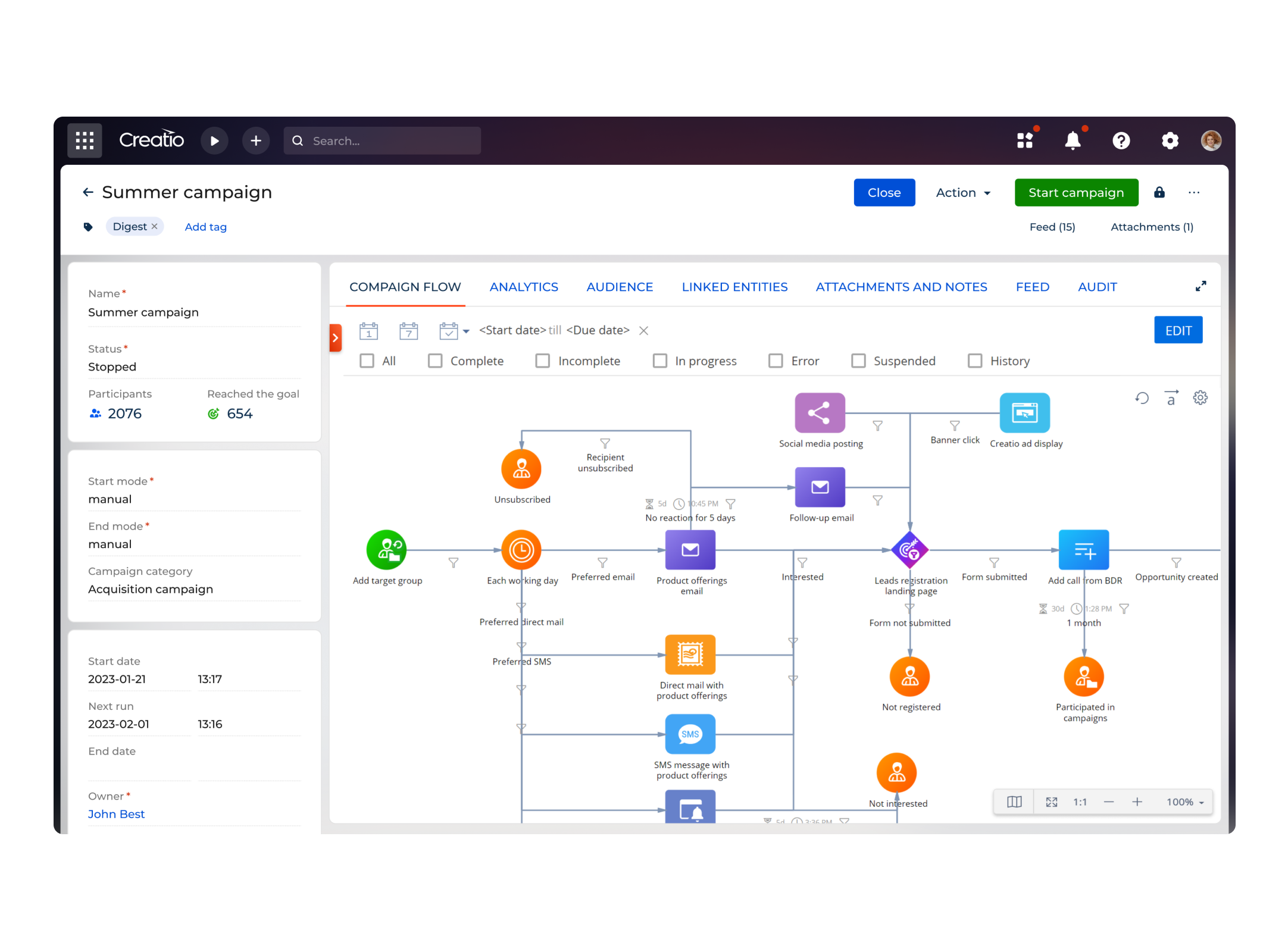
Creatio’s marketing management
Furthermore, using marketing automation tools integrated into retail CRM systems, businesses can streamline campaign execution and ensure consistency across all touchpoints. Automated workflows enable marketers to schedule and send targeted communications, track campaign performance in real-time, and optimize strategies based on actionable insights. This not only saves time and resources but also maximizes the impact of marketing initiatives.
Also, a key strategy for engaging customers and fostering loyalty is implementing loyalty programs. Retail CRM systems often include dedicated functionalities for loyalty program management, allowing businesses to create and manage various types of programs. These programs enable customers to earn and redeem rewards seamlessly across multiple channels, enhancing their overall shopping experience and encouraging repeat purchases. By analyzing the performance of loyalty programs, businesses can identify opportunities for improvement and tailor rewards to better meet customer needs.
7. Order and delivery
The retail CRM system offers omnichannel order management features, empowering retailers to seamlessly manage orders across multiple sales channels, including online, in-store, and mobile platforms. Through automated workflows and order processing features, CRM systems streamline the order fulfillment process, reducing manual intervention and expediting order processing times. Real-time visibility into inventory levels enables retailers to automatically accept orders and route them to the appropriate warehouse for processing, ensuring efficient inventory management and timely order fulfillment.
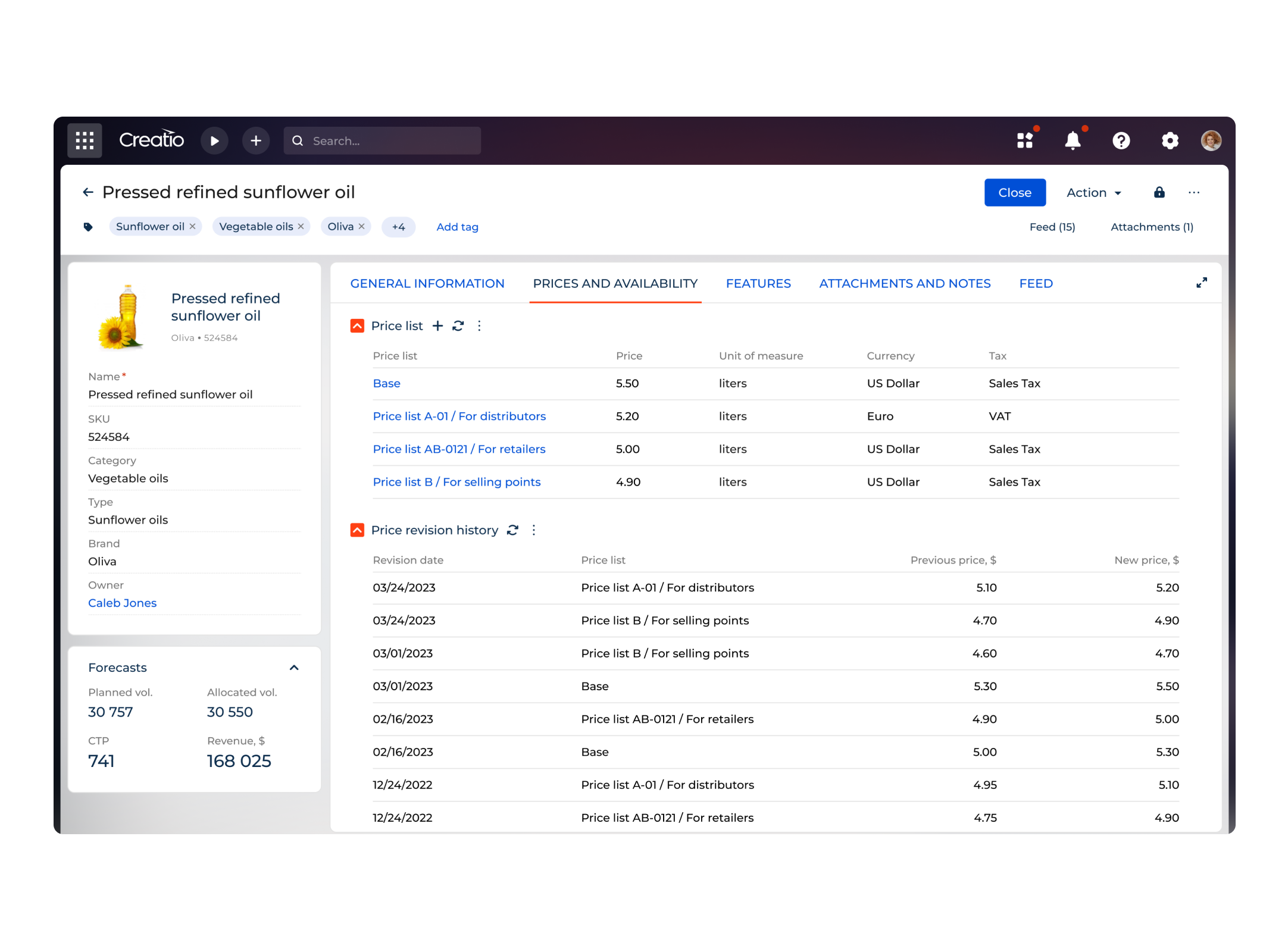
Creatio’s order and delivery
Moreover, a robust CRM solution tailored for retail empowers businesses to manage their delivery processes with efficiency and precision. By automating every step of the process, from calculating shipping costs based on address to coordinating with delivery services, CRM systems streamline logistics operations and optimize delivery routes. Automated communication with customers through email notifications at each stage of the delivery process enhances transparency and builds trust, reducing the number of customer inquiries related to order status and ensuring seamless shopping experiences.
Furthermore, retail CRM systems play a vital role in managing returns and exchanges, providing a streamlined process for customers to initiate returns and for retailers to process refunds or exchanges efficiently. By centralizing return management processes within the CRM platform, retailers can track return requests, manage inventory levels, and efficiently process refunds or exchanges enhancing customer satisfaction.
8. Risk and compliance
Retail CRMs help retailers manage customer privacy and regulatory compliance by providing tools to secure customer data and adhere to industry regulations. With built-in features for data encryption, access control, and compliance monitoring, CRM systems ensure that retailers maintain the highest standards of data protection and privacy.
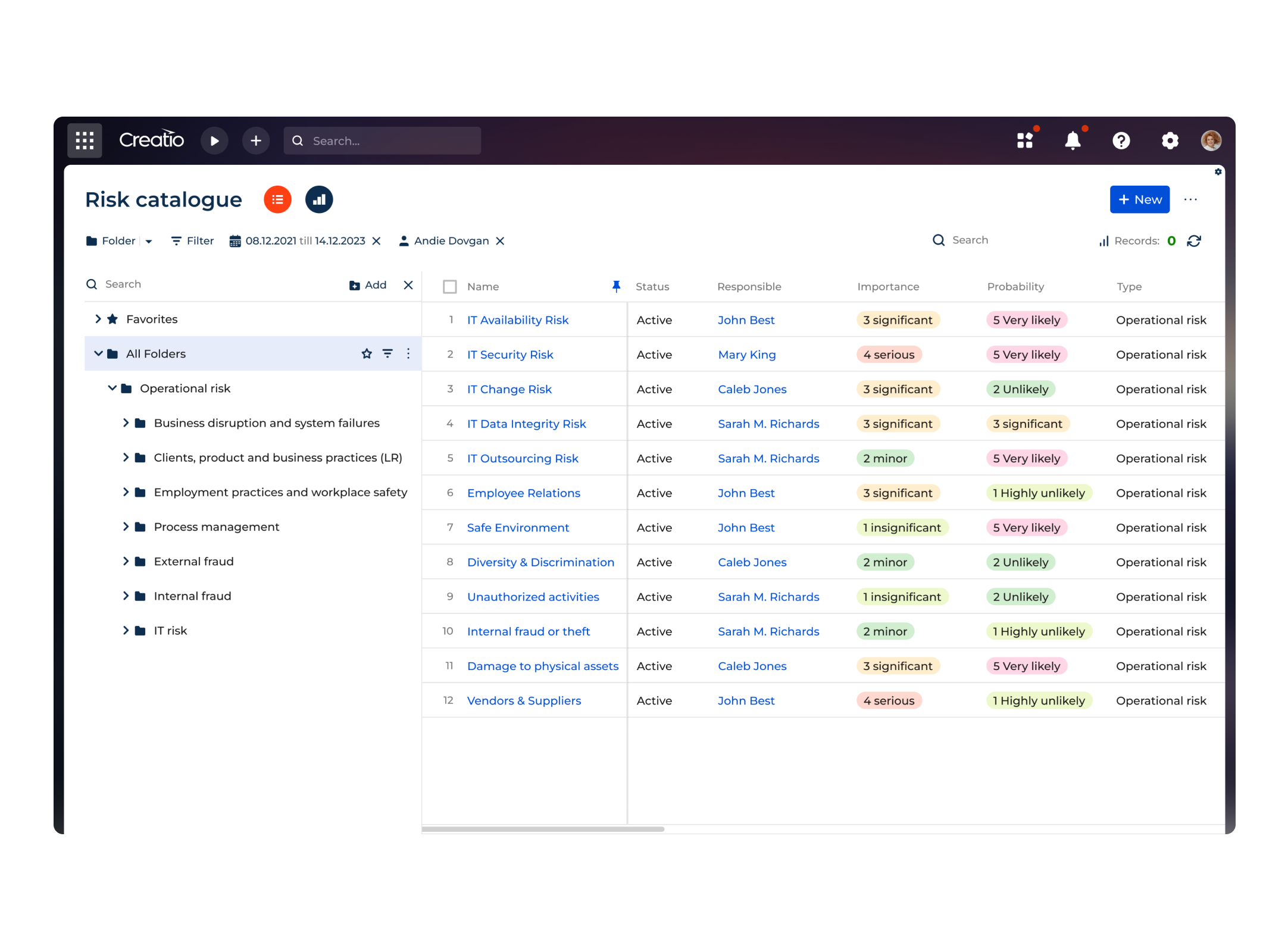
Creatio’s risk and compliance
Additionally, CRM platforms often include features for managing consent preferences, allowing retailers to obtain and track customer consent for data usage and communication purposes in accordance with regulations such as GDPR (General Data Protection Regulation). By centralizing customer data and implementing robust privacy controls, retail CRM systems enable retailers to mitigate risks associated with data breaches, safeguarding sensitive customer information.
9. Employee experience
CRM for retail also supports the entire employee lifecycle, from recruitment to retention and exit, and improves the employee experience by providing a user-friendly solution to automate all types of requests. This includes features for onboarding new employees, managing performance evaluations, and facilitating training and development initiatives. Additionally, CRM platforms often include modules for tracking employee time and attendance, managing schedules and processing payroll, and streamlining administrative tasks.
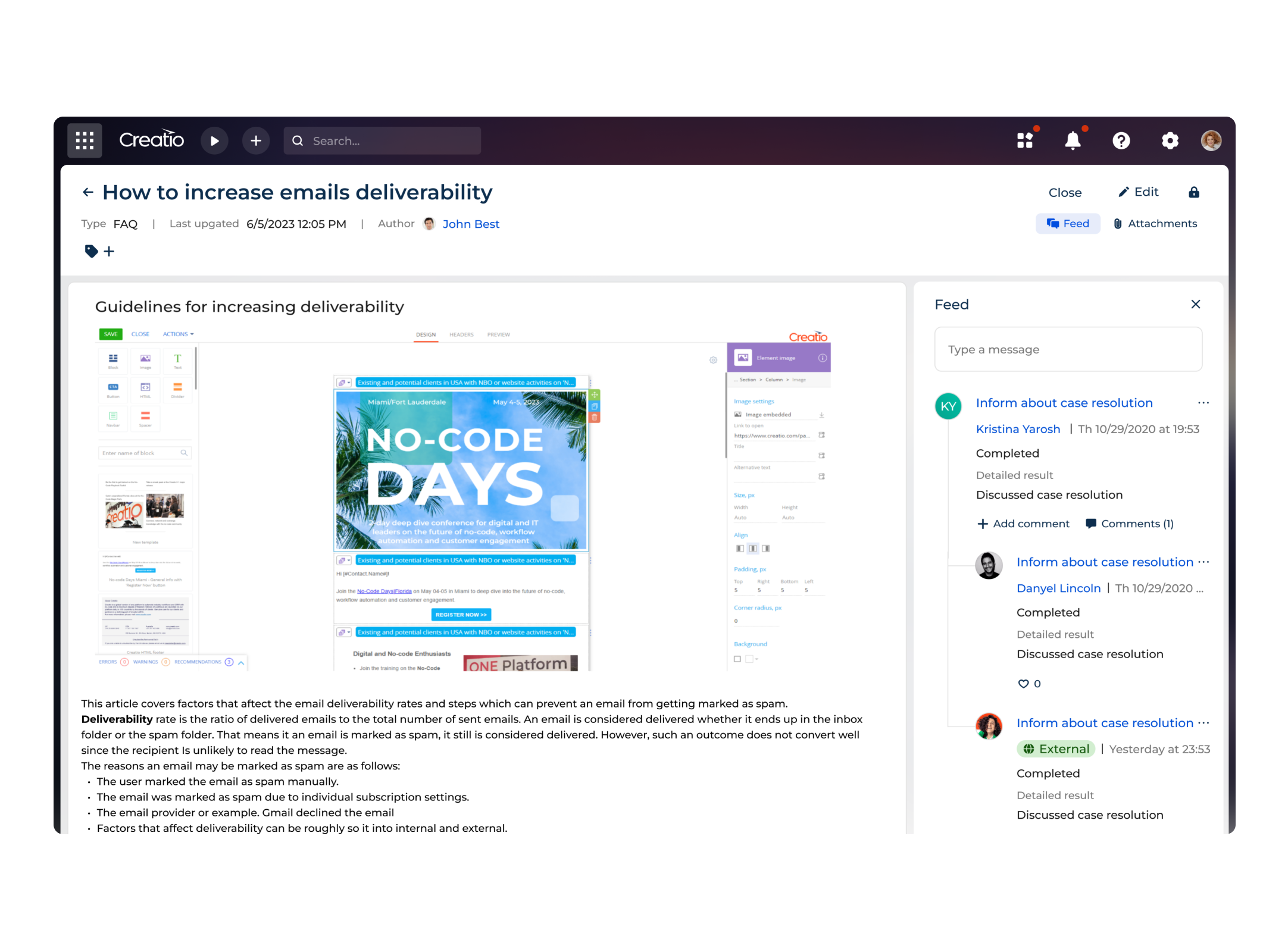
Creatio’s employee experience
Moreover, CRM fosters a culture of teamwork by centralizing communication, collaboration, and knowledge-sharing among teammates. With features such as chat, and document sharing, CRM platforms facilitate real-time communication and collaboration, enabling employees to work together more efficiently and effectively.
How AI enhances Retail CRM capabilities
Supported by powerful generative, predictive, and agentic AI capabilities, CRMs for retail can enhance personalization at scale, streamline store operations, and improve customer experiences.
Personalized product recommendations
Thanks to AI’s ability to quickly analyze vast amounts of customer data, AI-powered CRMs can automatically surface the most relatable products for each customer. AI prepares these upselling and cross-selling recommendations based on individual profiles, pulling information about customers’ past purchases, potential needs, and online searches.
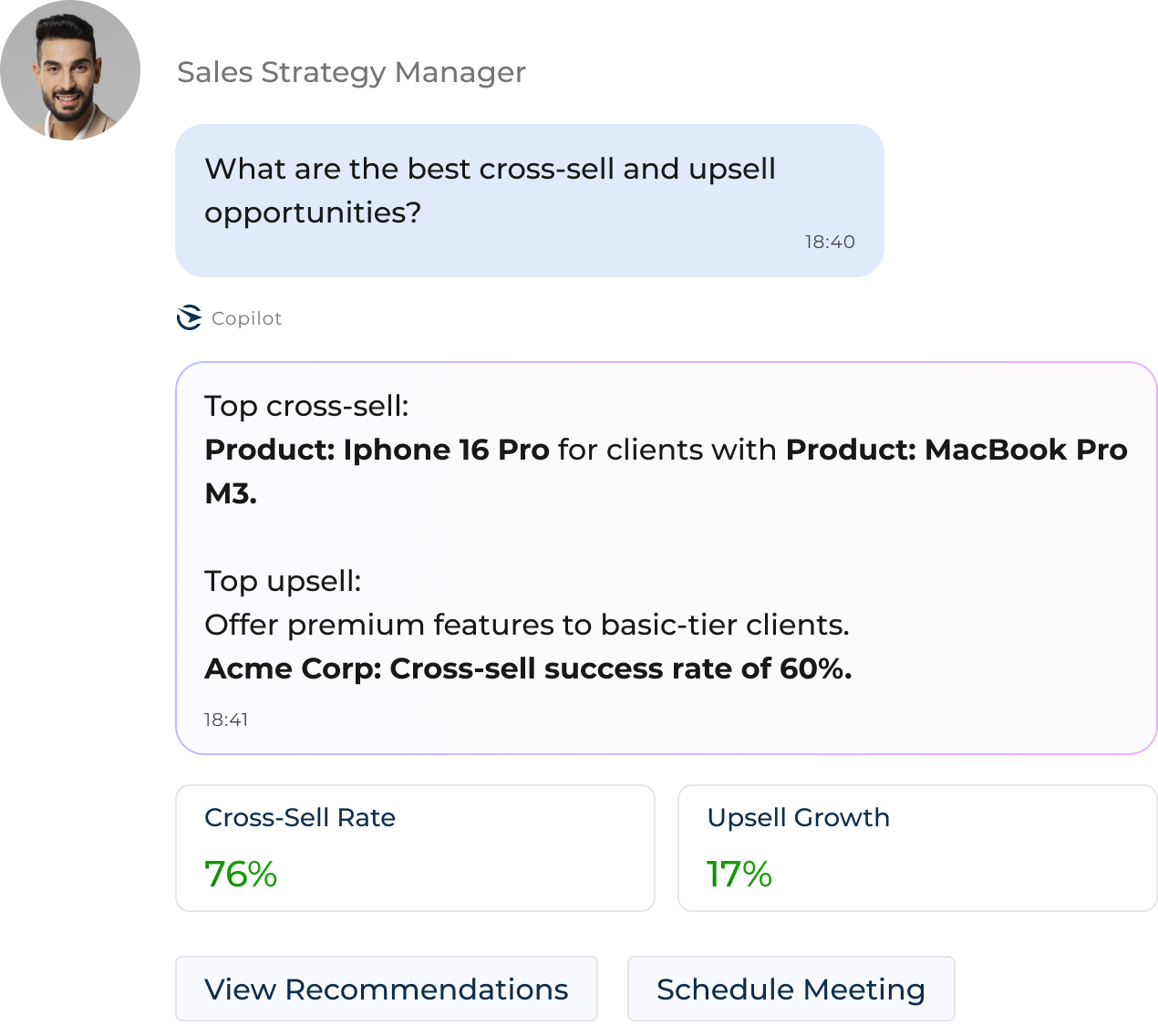
Recommendations are updated in real-time as the CRM collects new data and can be displayed directly on the website (think about Amazon’s “You may also like” section) or sent through an email.
Automatically generated product descriptions
AI-powered retail CRM can help retail businesses create unique and compelling product descriptions. AI analyzes product descriptions on the website and then automatically generates new ones based on product specification cards and visual features. Descriptions can be adjusted by human employees to ensure accuracy or automatically published on the website.
Additionally, AI systems can prepare descriptions for different uses, for example, Google Shopping, generating concise, keyword-rich snippets that meet platform-specific requirements and drive click-through rates.
Dynamic content creation
Retail CRM supported by AI capabilities can help marketing professionals personalize marketing emails, ads, and website content based on customer segments or individual profiles. This way, retail businesses can create engaging content at scale to increase engagement and conversion rates.
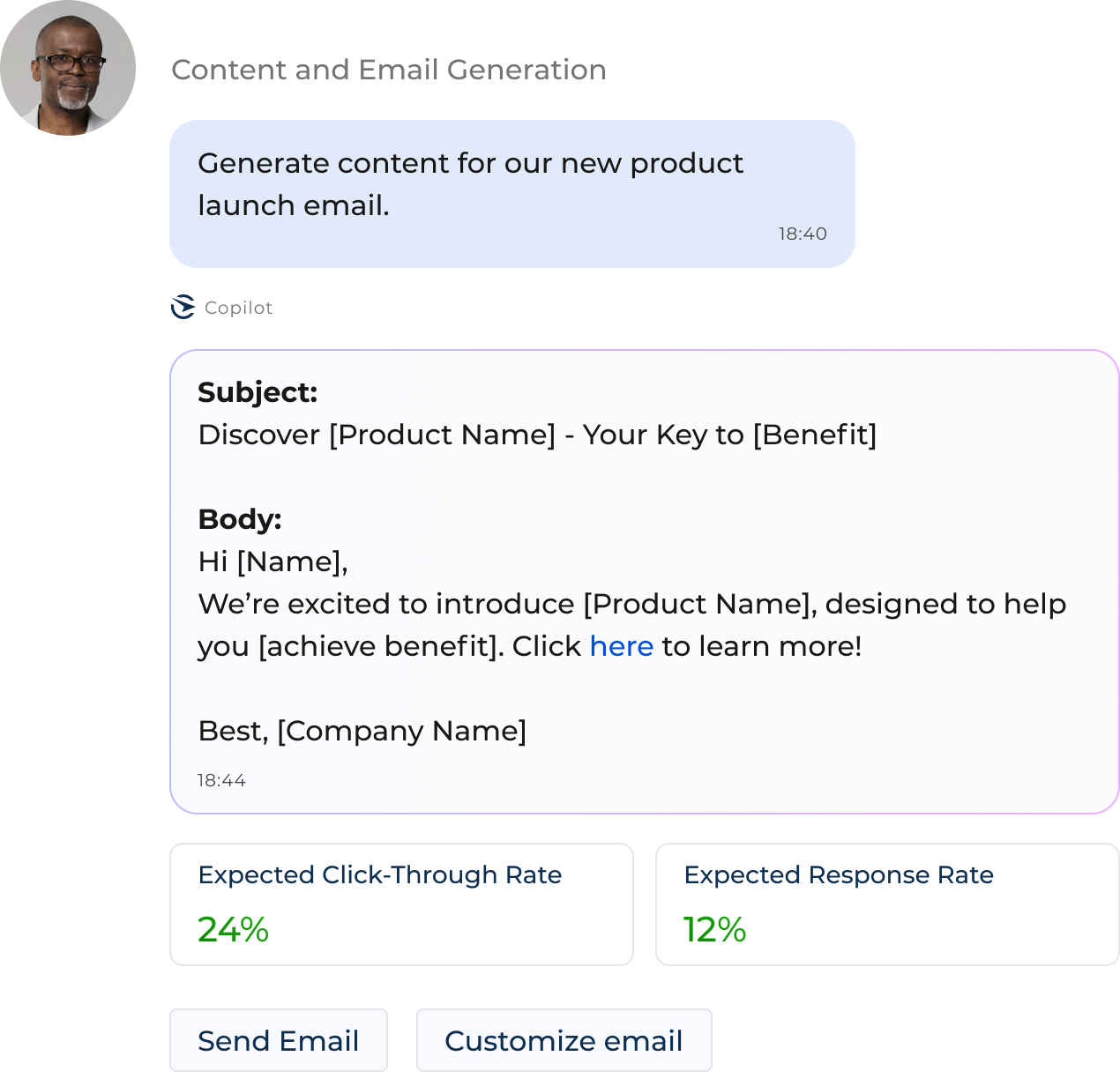
Demand forecasting
Artificial intelligence supports accurate demand forecasting. Retail shops no longer have to guess what products will be in demand in the next seasons. Instead, they can rely on AI-powered insights to make data-driven decisions that accurately reflect customers’ needs.
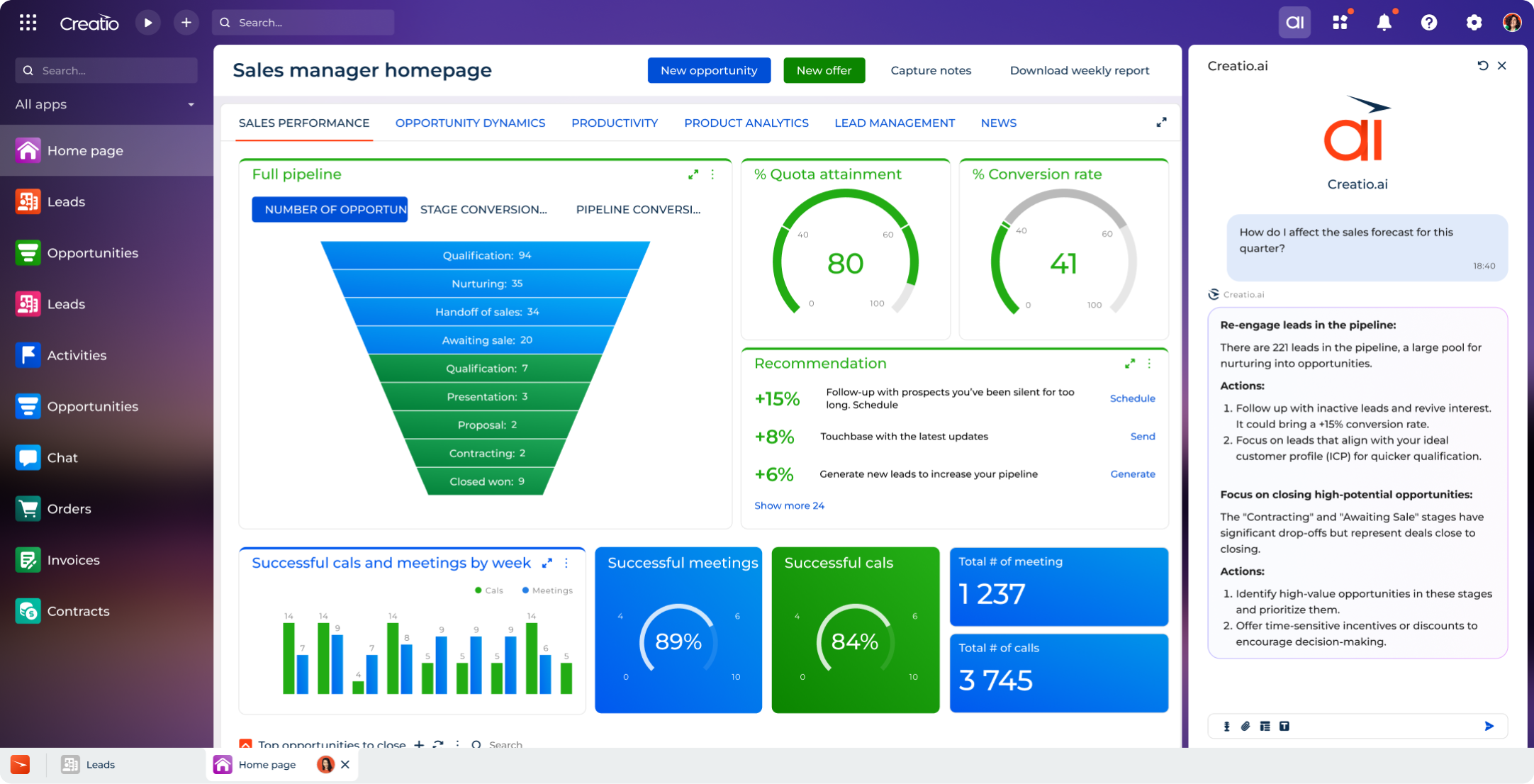
AI analyzes vast amounts of data, including past sales data, seasonality, and market trends to aid demand forecasting. Thanks to this information, retail businesses can optimize their inventory management and reduce stockouts, ensuring the products they have in store are the ones customers want to purchase.
Marketing campaign optimization
AI-powered tools provided by retail CRMs can help marketing professionals optimize campaigns to increase conversion rates. From carrying out email campaign A/B tests to adjusting ad placing and visuals in real-time, AI ensures that marketing efforts are optimized to achieve maximum engagement.
For example, AI can test out different variations of email subject lines and calls-to-action (CTAs) personalized to specific customer segments. It then automatically identifies the best-performing elements and applies them. In the case of online ads, AI tools can optimize ad spend by analyzing real-time performance across various platforms (Google Ads, social media, display networks). It automatically adjusts bids and budget allocation to the highest-performing channels and creatives, maximizing ROI.
Intelligent inventory replenishment
AI can monitor inventory levels in real-time to automatically reorder products to avoid stockouts that lead to lost sales and customer dissatisfaction. It can also apply demand forecasting capabilities to satisfy future demand.
Dynamic pricing adjustments
AI constantly analyzes demand, competitor pricing, and market fluctuations in real time to dynamically adjust product prices on multiple platforms. For example, if AI detects that a competitor lowered their prices on specific products, it can adjust the shop prices accordingly to ensure it stays competitive.
Personalized customer service
Modern retail CRMs provide businesses with AI features that power intelligent chatbots to improve customer service. Chatbots equipped with NLP (natural language processing) capabilities can offer more natural and contextually relevant interactions, providing customers with instant support available 24/7. Chatbots can answer frequently asked questions, offer product recommendations, and perform simple tasks on behalf of customers, such as checking delivery status and return policies.
Additionally, AI can support customer support agents in solving more complicated cases. AI can provide a summary of customer orders, surface necessary product information, and even suggest the best way to resolve a case, ensuring customer satisfaction.
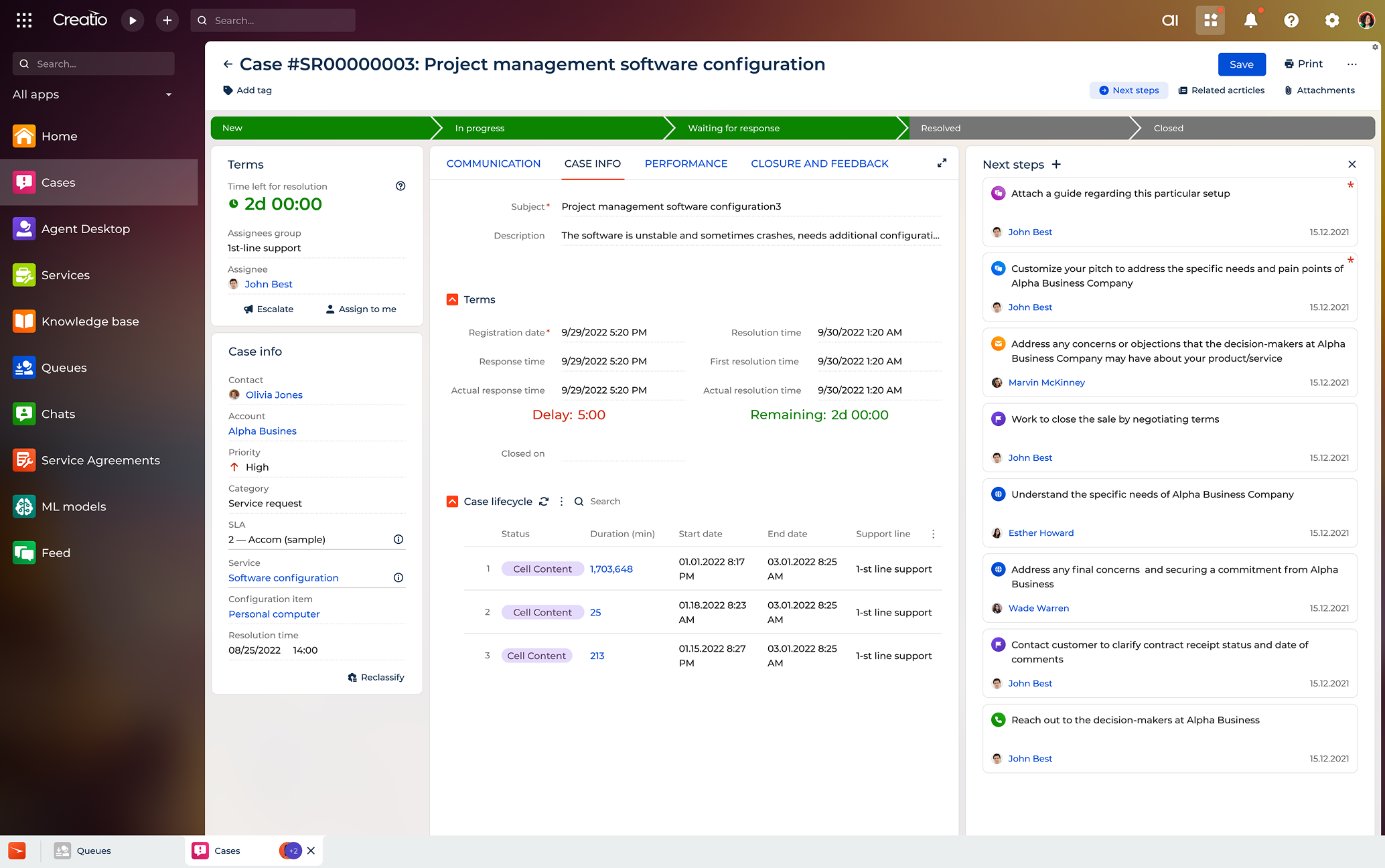
5 Leading CRM Solutions for Retail Businesses
Choosing the right CRM is crucial for retail success. While many CRM platforms offer general functionalities, some stand out with features specifically tailored to the unique needs of retail businesses.
Here are five top CRM solutions often considered by retail businesses:
1. Creatio CRM
Creatio is an agentic platform to automate CRM and workflows with no-code that offers the best retail CRM software due to its tailored solutions designed specifically to meet the unique needs and requirements of retail shops. With a dedicated CRM offering, Creatio understands the intricacies of the retail industry and provides features and functionalities to address them effectively.
From comprehensive customer data management to procurement and logistics, Creatio's retail CRM empowers retailers to streamline operations, enhance customer engagement, and drive business growth. With customizable workflows, an intuitive interface, Creatio's retail CRM enables retailers to optimize their processes and ensure integration with existing systems.
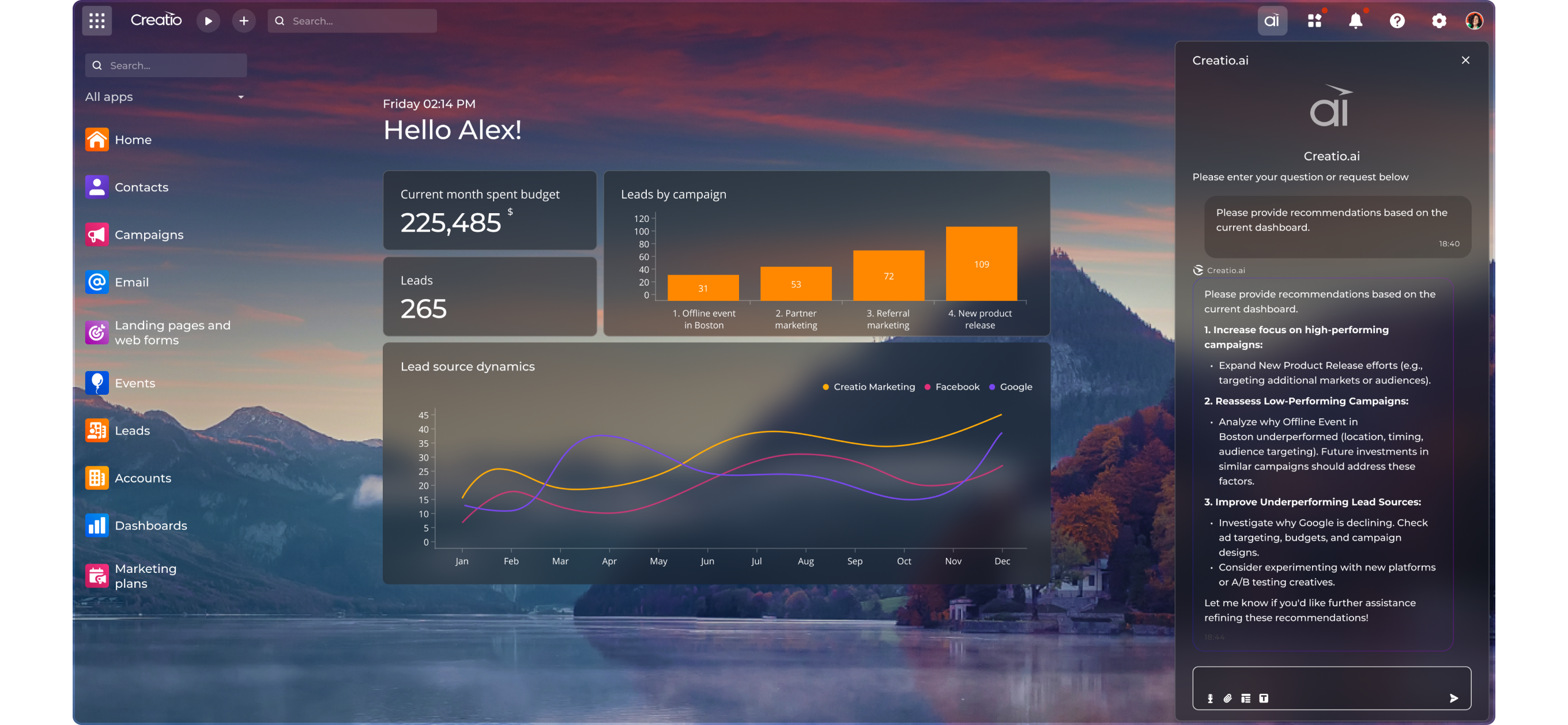
Creatio offers powerful AI capabilities - Creatio.ai that combines all key AI patterns, including generative, predictive, and agentic AI into a cohesive architecture to increase employee productivity. With generative AI capabilities, Creatio.ai can automatically draft personalized marketing emails and product descriptions based on customer data and preferences. By using predictive AI, retailers gain deep insights into customer behavior, allowing them to accurately forecast demand, personalize product recommendations, and optimize inventory management. Furthermore, AI agents can autonomously carry out multiple tasks, such as dynamically adjusting product pricing in real-time based on market conditions, automating complex marketing campaign workflows, or intelligently managing inventory replenishment to prevent stockouts.
Key features:
- 360-degree view of customer data
- Creatio.ai
- merchandise management
- procurement and logistics
- store operations
- order and delivery
- risk and compliance
- employee experience
- comprehensive workflows for sales, marketing, and customer service
Pros:
- Highly customizable - Creatio offers composable architecture that allows non-technical users to customize their solutions with no-code, drag-and-drop functionality, and pre-built components.
- User-friendly interface – offers intuitive interface that helps business users navigate the system without any problems.
- Flexible and scalable - suitable for both large retailers as well as small boutiques, Creatio can be customized to fit specific needs, and scale alongside business growth.
- AI at the core of the platform – Creatio.ai is front and center of the platform, not an add-on wrapped around a legacy solution, and enables intuitive automation for every object and workflow with natural language.
- Actionable AI - enhances tools that retail business employees already use to surface insights and increase productivity.
- Robust security features - Creatio safeguards sensitive customer information with end-to-end encryption, multi-factor authentication, and role-based access control.
- Powerful data analytics and reporting - equipped with interactive dashboards and real-time data-driven insights, Creatio supports informed decisions.
- Seamless integration with third-party apps - Creatio offers built-in integration capabilities as well as robust APIs that allow retail businesses to connect with over 700 applications, including payment gateways, ERP, shipping providers, and e-commerce platforms.
- Transparent pricing - Creatio offers transparent pricing with no hidden costs for extra features, add-ons, or advanced capabilities, such as Creatio.ai.
Cons:
- Initial learning curve - due to limitless customization options and extensive capabilities, Creatio might be slightly overwhelming at first for new CRM users.
Rating:
- G2: 4.6/5
- Software Advice: 4.7/5
Pricing:
Creatio offers a composable pricing solution that enables users to only pay for features they are really going to use. The pricing for Creatio CRM depends on the chosen platform and products:
No-code platform:
- Growth - $25 USD per user / month for SMB clients
- Enterprise - $55 USD per user/month for corporate and enterprise needs
- Unlimited - $85 USD per user / month for advanced enterprise scenarios
Products:
- Sales/Marketing/Service - $15 USD per product/user/month
- Creatio.ai - available throughout the whole platform at no extra cost
2. Salesforce
Salesforce offers a comprehensive suite of cloud-based CRM applications designed to enable personalization across ecommerce, stores, marketing, and service. For retail, it provides an actionable view of customers, inventory, and orders and capabilities to automate sales processes and customer service with AI.
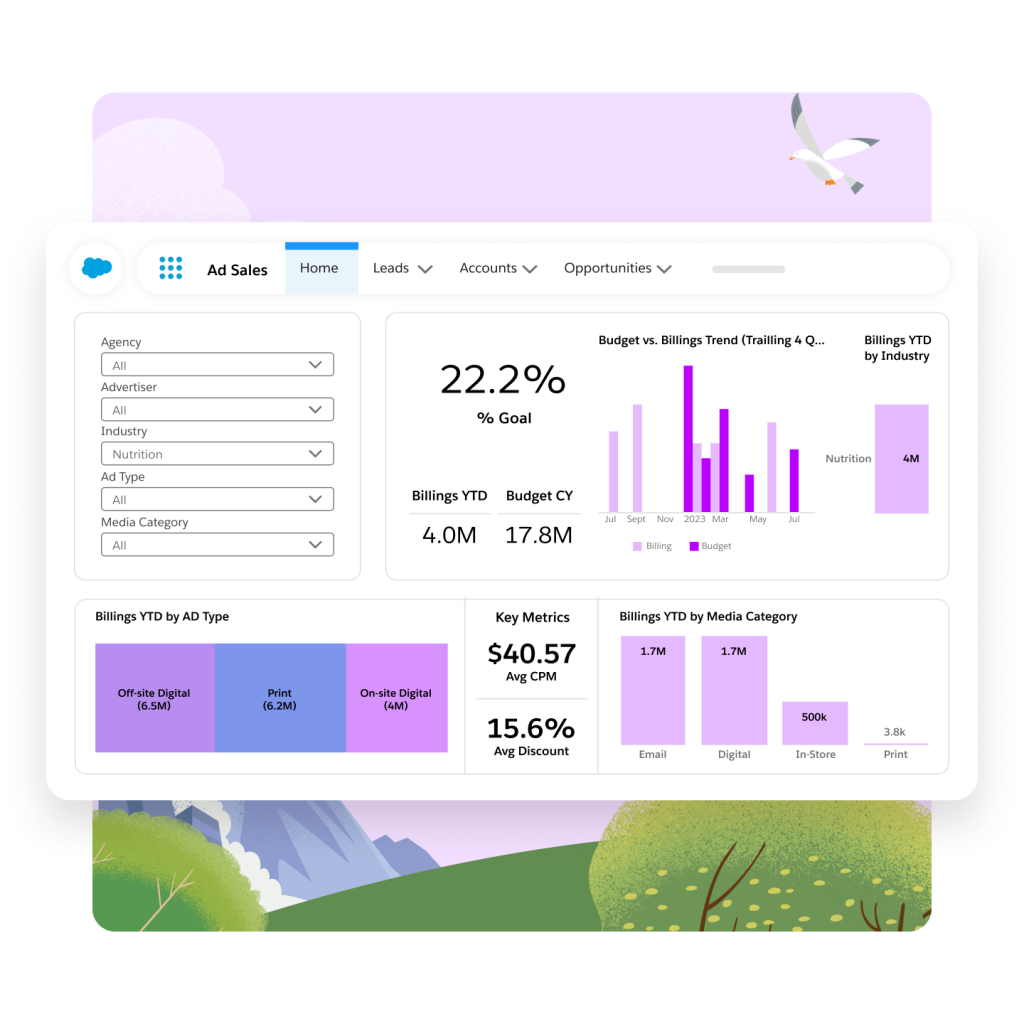
Features:
- Marketing Cloud
- Sales Cloud
- Service Cloud
- shopping forecasting
- loyalty and referral management
- omnichannel commerce
- AI-powered assistant Einstein
- POS tools
Pros:
- Highly scalable and customizable - Salesforce can be adapted to unique business needs thanks to extensive customization options.
- Comprehensive features - offers multiple functionalities for sales, marketing, service, and analytics.
- Seamless integration - integrates with multiple third-party applications through its AppExchange marketplace.
- AI-powered insights - Einstein AI provides predictive analytics and personalized recommendations.
- Unified customer view - can integrate online and offline customer data for a 360-degree view, enhancing omnichannel strategies.
Cons:
- High cost - Salesforce can be very expensive, especially for smaller businesses or retailers that require extensive customization and add-ons.
- Fragmented features - Salesforce offers fragmented features that force users to acquire multiple solutions to fully benefit from the platform capabilities.
- Complexity and learning curve - users reported a steep learning curve and need to spend a significant amount of time and resources on implementation and ongoing management.
- Complex customization - users reported need to hire Salesforce-certified consultants at extra cost for customization due to complexity of the platform.
- Feature overload - many businesses may not utilize all the features they need to pay for, which further skyrockets the costs.
- Hidden costs - advanced features, such as AI and add-on like Marketing Cloud, Service Cloud, etc., come at extra cost.
- System lagging - businesses with large datasets experience high system lagging.
Rating:
- G2: 4.5/5
- Software Advice: 4.4/5
Pricing:
Pricing for Salesforce varies significantly between different solutions with multiple add-ons and advanced features at extra costs. Here’s a breakdown of pricing tiers for Sales Cloud platform:
- Starter Suite - $25 USD per user/ month
- Professional - $80-100 USD per user/month
- Enterprise - $165 USD per user/month
- Unlimited - $330 USD per user/month
- Agentforce 1 Sales (includes AI features) - $550 USD per user/month
See also: Salesforce Alternatives & Competitors and Salesforce Marketing Cloud Alternatives & Competitors
3. HubSpot CRM
HubSpot offers an AI-powered CRM software that unifies customer data, teams, and tech stack into one platform. It offers an integrated suite of CRM, Marketing, Sales, and Service Hubs to centralize data and automate interactions. With HubSpot, retailers can offer more personalized customer experiences at scale.
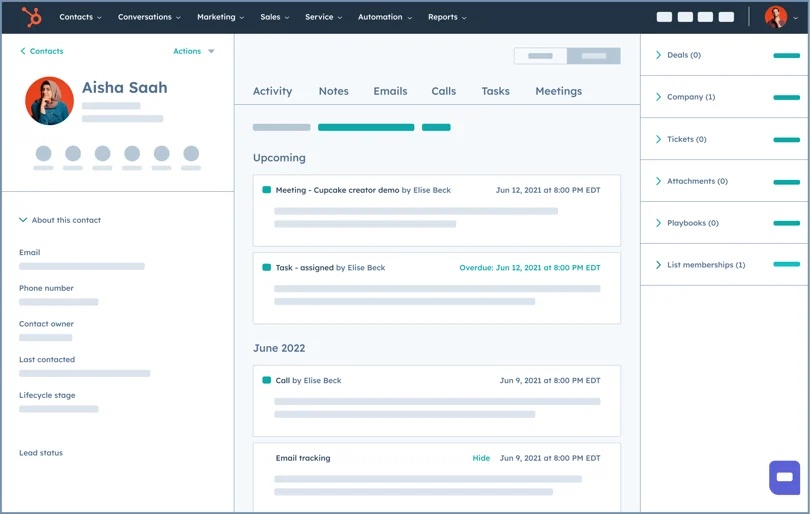
Features:
- contact management
- contact scoring
- workflow automation
- custom integrations
- reporting dashboards
- Marketing Hub
- Sales Hub
- Service Hub
- Breeze Copilot AI
Pros:
- User-friendly interface - users reported that HubSpot has an intuitive design and is easy to use.
- Free CRM - offers a free tier for basic CRM functionalities for small businesses and startups.
- All-in-one platform - seamlessly integrates marketing, sales, and service tools.
- Powerful content tools - HubSpot provides great tools for managing blogs, landing pages, email marketing, and social media.
- E-commerce integrations - integrates with platforms like Shopify and WooCommerce.
- AI-powered capabilities - HubSpot offers AI-powered copilot - Breeze, which helps users automate workflows, assist with tasks, and enrich data.
Cons:
- Pricing complexity - initial costs for HubSpot can escalate quickly as businesses need to add more contacts, advanced features, or multiple Hubs.
- High onboarding fees - higher-tier plans often come with mandatory one-time onboarding fees.
- Less advanced features for retail-specific workflows - HubSpot doesn’t offer advanced retail tools and may require more third-party integrations compared to enterprise-grade CRM systems.
- Higher cost for AI capabilities - Copilot Breeze functionalities are only available in the higher-pricing tires, making them unavailable for SMB.
Rating:
- G2: 4.4/5
- Software Advice: 4.4/5
Pricing:
- Free CRM - limited features and contacts for up to 2 users
- Starter (Sales, Marketing, Service Hubs) - $20-$50 USD per hub/user/month
- Professional - $80-$100 USD per hub/user/month (Sales/Service) and $890 USD for 3 user per month (Marketing)
- Enterprise - $150 USD per user/month (Sales/Service) and $3,600 USD for 5 users per month (Marketing)
See also: Top 10 HubSpot Alternatives & Competitors
4. Zoho CRM
Zoho CRM is an integrated CRM platform for sales, marketing, and customer service teams that caters to small and medium-sized businesses. It offers a range of capabilities tailored to retail shops that help them manage retail and supply chain operations effectively.
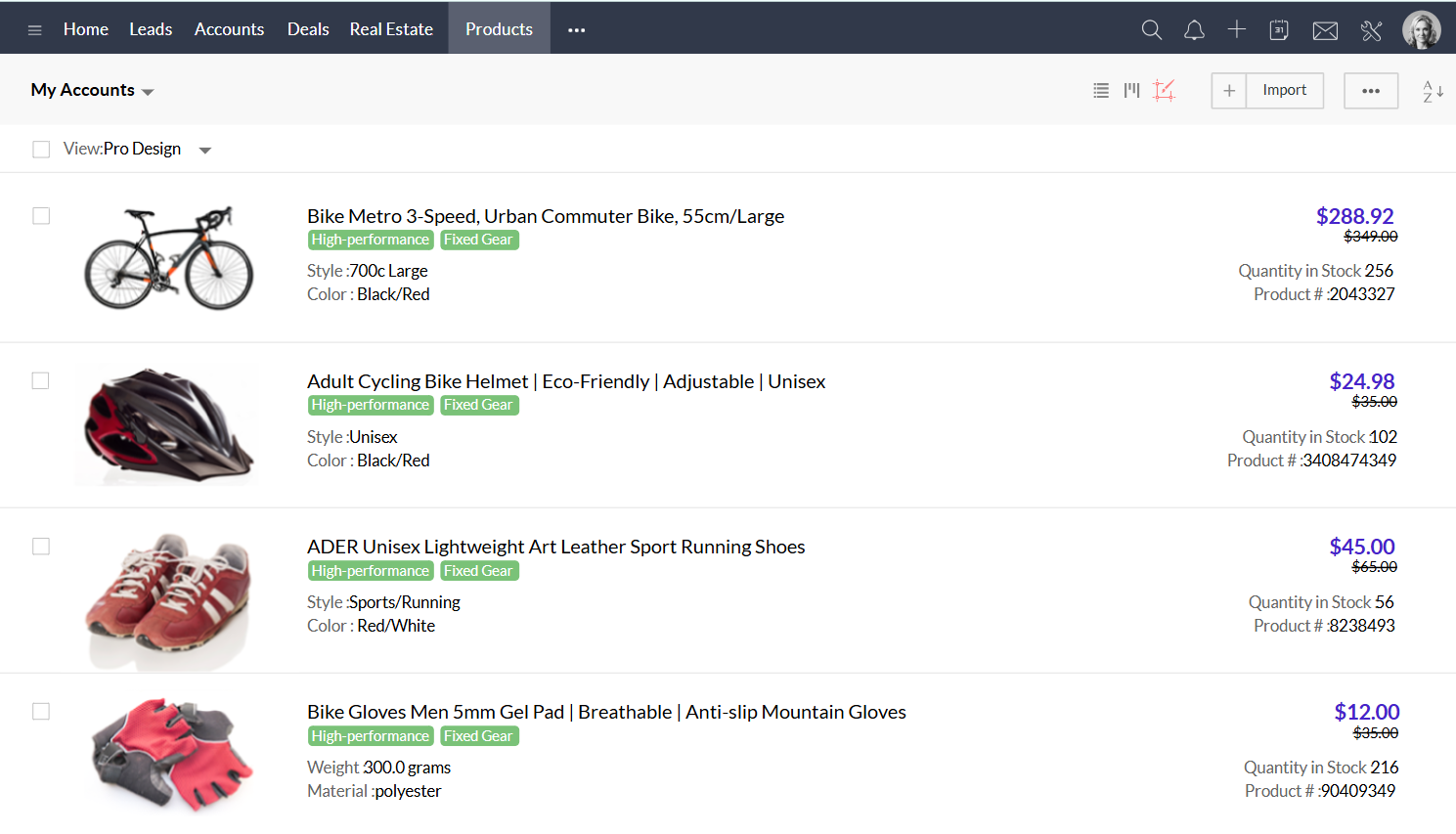
Features:
- inventory management
- marketing campaign management
- omnichannel sales
- online product and service catalog
- social media trend capturing
- reporting and analytics
- territory management
- sales forecasting
- AI assistant Zia
Pros:
- Free tier - offers a free tier for startups and small businesses with up to 3 users.
- User-friendly and customizable - Zoho CRM is easy to navigate and customize to fit specific retail workflows.
- Strong Zoho ecosystem - seamlessly integrates with other Zoho applications (Zoho Books, Zoho Campaigns, etc.).
Cons:
- Unsuitable for large enterprises - less robust and scalable for large businesses and complex retail operations.
- Limited customer support - some users report that standard support can be limited, with premium support often entailing additional costs.
- Feature limitations - Zoho provides less tailored features for retail businesses compared to competitors and certain advanced features, such as AI capabilities are only available in higher-tier plans.
- Issue with AI - some users reported problems with incoherent responses by AI-powered chatbots.
- Static reports - reports available in Zoho CRM are not interactive, and users face problems with automating reporting management.
Rating:
- G2: 4.1/5
- Software advice: 4.3/5
Pricing:
- Standard - $14 USD per user/month
- Professional - $23 USD per user/month
- Enterprise - $40 USD per user/month
- Ultimate - $52 USD per user/month
See also: Top 10 Zoho CRM Alternatives and Competitors
4. Microsoft Dynamics 365 for Retail
Microsoft Dynamics 365 for Retail is an end-to-end retail solution that unifies back-office, in-store, and e-commerce experiences. It provides comprehensive tools for managing omnichannel operations, customer engagement, product information, and supply chain, making it a good solution for larger retail chains and enterprises already invested in the Microsoft ecosystem.
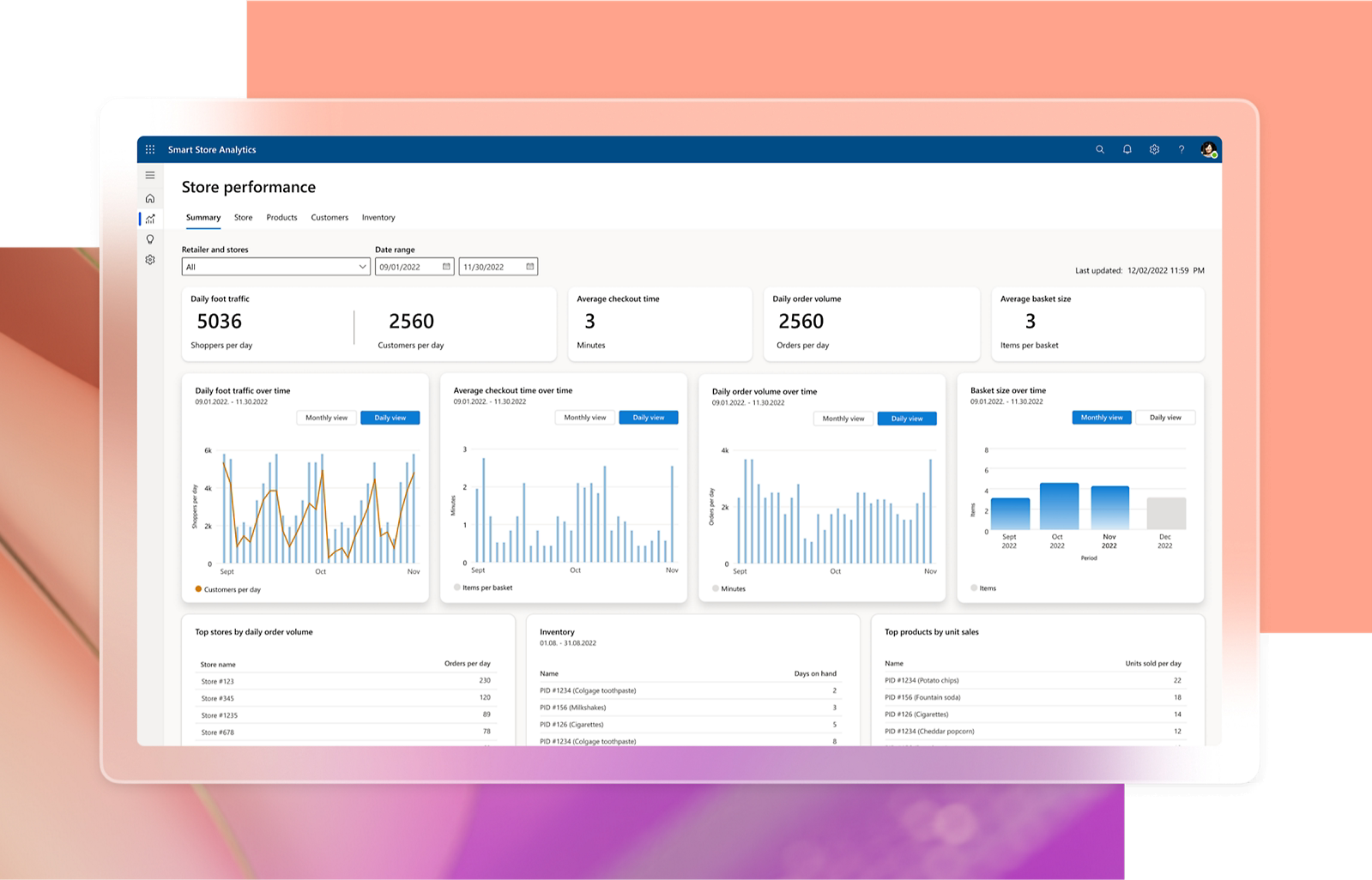
Features:
- merchandising
- inventory management
- channel management
- analytics and data-driven insights
- generative AI capabilities
Pros:
- Ease of use - users reported that Microsoft is easy to use and intuitive.
- Seamless Microsoft integration - integrates with other Microsoft products like Azure, Power BI, Office 365, and other Dynamics 365 modules (Sales, Service, Finance).
- Effective scalability for enterprises - Microsoft can scale to fulfil the complex needs of large retail businesses.
- Robust features - provides robust industry-specific features that enable retailers to customize the Microsoft CRM to their needs.
Cons:
- High cost and complexity - users reported that Microsoft Dynamic 365 can be very expensive and complex to implement and customize, often requiring significant IT resources or specialized partners.
- Additional costs - advanced features are only accessible in higher-priced tiers or as add-ons that require significant investment.
- Customization challenges - customizations may require significant development work or engaging customer support which increases the overall costs.
- Frequent disruptions - frequent updates of Microsoft, although helpful, disrupt users’ workflows and complicate system interface.
- Poor customer service - some users reported problems with receiving adequate customer service support.
Rating:
- G2: 4.6/5
- Software Advice: 4.6/5
Pricing:
- Dynamics 365 Commerce - $210 USD per user/month for core capabilities
- E-Commerce add-on - $4,000 USD per user/month
Revolutionizing Retail – Unleashing the Power of CRM
Retail CRM offers tailored solutions that cater specifically to the unique needs of retail businesses. It goes beyond traditional CRM functionalities, providing retailers with tools to optimize inventory and merchandise management, improve order and delivery management, and execute targeted marketing campaigns. By centralizing customer data and purchase history, retail CRM enables businesses to personalize offerings, anticipate consumer preferences, and enhance the overall shopping experience. In an industry where customer loyalty and satisfaction are paramount, retail CRM becomes indispensable, driving revenue growth and fostering lasting relationships with the customers.
Creatio CRM stands out as the best retail CRM solution. With its robust features, intuitive interface, and seamless integration options, Creatio offers unparalleled capabilities tailored specifically for the retail sector. From advanced automation tools to predictive analytics and personalized marketing campaigns, Creatio enables retailers to optimize processes, drive sales, and deliver exceptional customer experiences.





















































